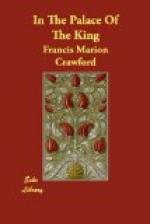she had soft dark hair, a sad and gentle face, with
eyes that were quite closed, and a delicate mouth
that had a little half painful, half pathetic way of
twitching when anything hurt her,—for she
was easily hurt. Very pale always, she turned
her face more upwards than do people who have sight,
and being of good average woman’s height and
very slender and finely made, this gave her carriage
an air of dignity that seemed almost pride when she
was offended or wounded. But the first hurt had
been deep and lasting, and she could never quite believe
that she was not offensive to the eyes of those who
saw her, still less that she was sometimes almost
beautiful in a shadowy, spiritual way. The blind,
of all their sufferings, often feel most keenly the
impossibility of knowing whether the truth is told
them about their own looks; and he who will try and
realize what it is to have been always sightless will
understand that this is not vanity, but rather a sort
of diffidence towards which all people should be very
kind. Of all necessities of this world, of all
blessings, of all guides to truth, God made light first.
There are many sharp pains, many terrible sufferings
and sorrows in life that come and wrench body and
soul, and pass at last either into alleviation or
recovery, or into the rest of death; but of those that
abide a lifetime and do not take life itself, the
worst is hopeless darkness. We call ignorance
‘blindness,’ and rage ‘blindness,’
and we say a man is ‘blind’ with grief.
Inez sat opposite her sister, at the other end of
the table, listening. She knew what Dolores was
doing, how during long months her sister had written
a letter, from time to time, in little fragments, to
give to the man she loved, to slip into his hand at
the first brief meeting or to drop at his feet in
her glove, or even, perhaps, to pass to him by the
blind girl’s quick fingers. For Inez helped
the lovers always, and Don John was very gentle with
her, talking with her when he could, and even leading
her sometimes when she was in a room she did not know.
Dolores knew that she could only hope to exchange
a word with him when he came back, and that the terrace
was bleak and wet now, and the roses withered, and
that her father feared for her, and might do some
desperate thing if he found her lover talking with
her where no one could see or hear. For old Mendoza
knew the world and the court, and he foresaw that
sooner or later some royal marriage would be made for
Don John of Austria, and that even if Dolores were
married to him, some tortuous means would be found
to annul her marriage, whereby a great shame would
darken his house. Moreover, he was the King’s
man, devoted to Philip body and soul, as his sovereign,
ready to give his life ten times for his sovereign’s
word, and thinking it treason to doubt a royal thought
or motive. He was a rigid old man, a Spaniard
of Spain’s great days, fearless, proud, intolerant,
making Spain’s honour his idol, capable of gentleness




